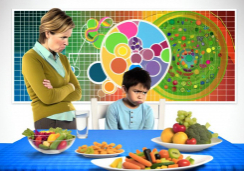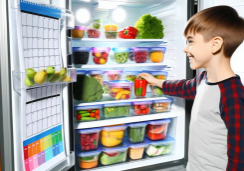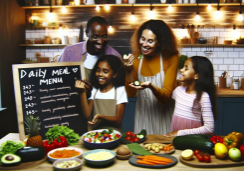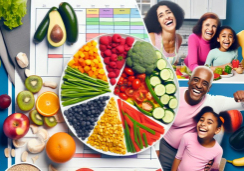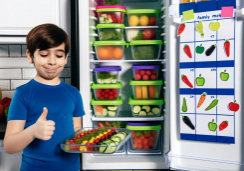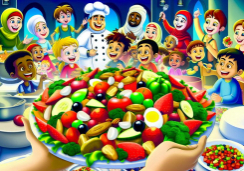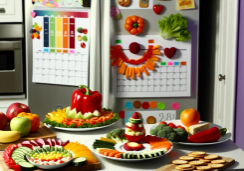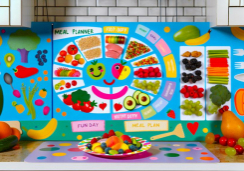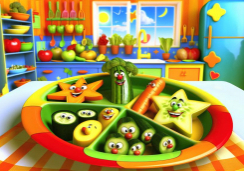Your Ultimate Guide to High-Protein Vegan Meals
Did you know that, contrary to popular belief, 33% of professional vegan athletes actually exceed their daily recommended protein intake solely through plant-based sources?
You might find this surprising, especially if you've ever faced skepticism about where you get your protein on a vegan diet. Fret not; you're about to discover that not only can you meet your protein requirements, but you can also enjoy a diverse and delicious array of high-protein vegan meals.
This guide is your go-to resource, whether you're looking to fuel your active lifestyle or simply aiming to infuse more plant-powered nutrition into your day. So, let's take a closer look at how you can craft satisfying meals that are as nutritious as they are flavorful, without compromising on that essential macronutrient.
Essential Protein Sources
To maintain a balanced vegan diet, it's crucial to incorporate key protein sources such as beans, lentils, tofu, edamame, and spinach, each offering a substantial amount of protein per serving.
Beans, for instance, aren't only a powerhouse of plant-based protein with about 15 grams per cup, but they also provide essential amino acids that are vital for muscle repair and growth.
Lentils, with their impressive 18 grams of protein per cup, are another staple that can help keep your energy levels up throughout the day.
Tofu, often celebrated for its versatility in vegan cuisine, packs in 20 grams of protein per cup. This makes it an excellent meat substitute that can easily adapt to various flavors and cooking methods.
Edamame, the young soybeans often enjoyed as a snack, contribute 17 grams of protein per cup and are a fun and nutritious addition to your meals.
Don't overlook the power of greens; cooked spinach provides 5 grams of protein per cup. While it's lighter on protein compared to other sources, it's packed with iron and other nutrients.
For a well-rounded diet, don't forget to add a variety of nuts and seeds to your meals, as they're also rich in proteins and healthy fats.
Daily Meal Breakdown
Understanding how to distribute your protein intake throughout the day is key for optimizing a high-protein vegan diet. As an athlete, you might need about 1.2 grams of protein per kilogram of your body weight. For the general vegan population, the USDA recommends 0.36 grams of protein per pound of body weight. This ensures you're getting enough protein to support your lifestyle and health goals.
To meet these needs with vegan protein, plan your meals around a variety of sources. Start your day with a high-protein vegan meal that includes grains like quinoa or oats, coupled with nuts and seeds. This could offer you a solid amount of protein to fuel your morning activities.
For lunch and dinner, focus on incorporating beans, legumes, or plant-based meats, which can provide between 20-30 grams of protein per serving. This way, you're not just meeting the amount of protein your body requires, but you're also enjoying diverse and flavorful meals.
Vegan Meal Preparation
After planning your high-protein vegan meals, it's time to focus on meal preparation, ensuring your diet remains rich in diverse protein sources throughout the week. Meal prep is a game-changer, not only for athletes who require consistent protein intake but for anyone on a vegan meal plan aiming to maintain a balanced diet with ease.
Consider the following as you dive into your meal prep routine:
- Embrace the convenience:
- Batch-cook grains like quinoa or brown rice; they're not just filling but also packed with protein.
- Simmer large pots of beans or lentils to use in various meals – think stews, salads, or wraps.
- Keep it interesting:
- Rotate your protein sources to avoid dietary monotony; explore the wide variety of plant-based meats or marinate and bake tofu for different flavors.
- Snack on nuts and seeds or sprinkle them over your dishes for a protein boost and added crunch.
Nutritional Balance Tips
When planning your high-protein vegan meals, it's crucial to incorporate a variety of plant-based proteins to achieve nutritional balance and meet your body's needs. Diversifying your protein sources, such as beans, lentils, tofu, and quinoa, ensures you're consuming all essential amino acids. A registered dietitian can provide personalized advice to guarantee you're getting enough protein within your plant-based diet.
Pair these proteins with nutrient-rich foods like colorful fruits, vegetables, and whole grains. This combination not only supports your general health but also enhances the absorption of various nutrients. For example, vitamin C-rich foods can increase iron absorption from plant sources, an important consideration for vegans.
Including healthy fats in your meals, from avocados, nuts, and seeds, is vital for nutrient absorption and long-lasting satiety. These fats also contribute essential fatty acids that support brain and heart health.
Lastly, don't overlook your fiber intake. High-fiber foods, such as legumes and whole grains, promote digestive health and can help regulate blood sugar levels. By carefully selecting your ingredients, you can create delicious, high-protein vegan meals that are nutritionally balanced and satisfying.
Week's Shopping List
Now that you're equipped with tips for nutritional balance in your high-protein vegan diet, let's create a shopping list to stock your pantry with the essentials. As you head to the grocery store, imagine the colorful and nutritious plant-based meals you'll craft from these whole foods.
Here's what you'll want to grab:
- Protein Powerhouses
- *Beans*: A versatile base for many dishes, offering about 15 grams of protein per cup.
- *Lentils*: A hearty choice with 18 grams of protein per cup, perfect for soups and salads.
- *Tofu*: With 20 grams of protein per cup, it's a great addition to stir-fries and scrambles.
- *Edamame*: Snack on these for a protein boost of 17 grams per cup.
- Greens and More
- *Spinach*: Not only for salads, this leafy green provides 5 grams of protein per cooked cup and can be seamlessly added to smoothies and pastas.
Each item on this list not only brings a protein punch but also a variety of vitamins and minerals vital for your health. By choosing these foods, you're setting yourself up for a week of delicious and high-protein vegan eating. Enjoy the process of nourishing your body with these plant-based choices.
Frequently Asked Questions
What Vegan Food Has the Highest Amount of Protein?
You'll find protein-packed quinoa offers a high amount, but for sheer protein density, tempeh benefits top the chart. Soy versatility also allows for various high-protein options across many vegan dishes.
What Do Vegans Eat on a High Protein Day?
On a high-protein day, you'd eat protein-rich grains like quinoa, a variety of legumes, and bust plant-based myths by enjoying ample tofu, tempeh, and plant-based meats, all packed with protein.
How to Get 140g of Protein a Day Vegan?
You'll need to include protein-rich grains, explore soy variety benefits, and consider plant-based supplements to reach 140g of protein daily on a vegan diet. Balance your meals for optimal nutrition.
How Can a Vegan Get 120g Protein?
To get 120g of protein, incorporate diverse foods for balanced amino acid profiles, monitor protein absorption rates, and choose supplements carefully, addressing safety concerns. Variety ensures you're meeting your nutritional goals effectively.
Conclusion
Now you're equipped to fuel your body with high-protein vegan meals! Embrace a variety of plant-based proteins daily to support muscle repair and growth.
Remember, meal prep is key to maintaining nutritional balance throughout the week. Stick to your shopping list, but don't shy away from experimenting.
With this guide, you'll keep your diet diverse, delicious, and protein-rich. Keep pushing your culinary boundaries, and watch your health and performance thrive.

